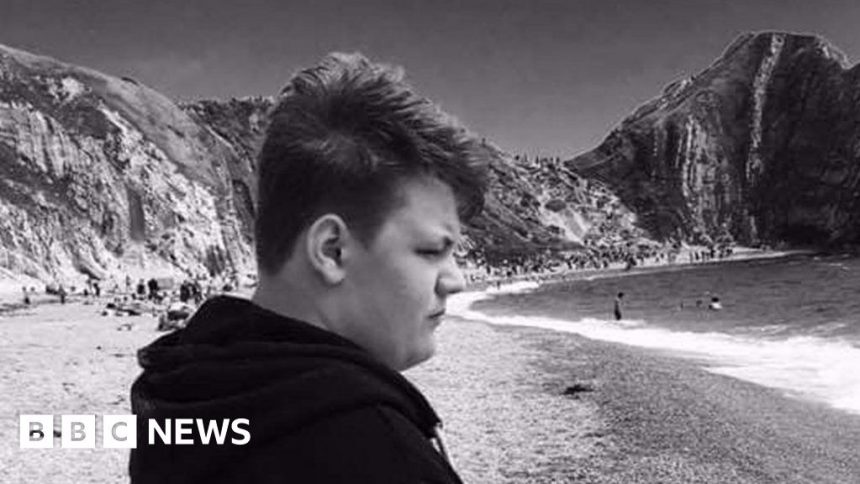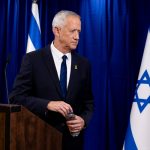Dunn family ‘upset’ killer will not attend inquest
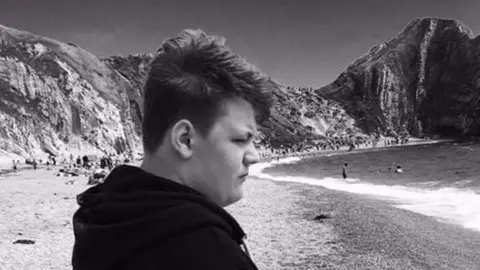 JUSTICEFORHARRY19
JUSTICEFORHARRY19The family of teenage motorcyclist Harry Dunn said they felt “shocked and upset” after finding out that the woman who killed their son in a road crash would not be giving live evidence at the inquest into his death.
Mr Dunn, 19, was hit outside US airbase RAF Croughton in Northamptonshire in 2019 by a car driven by American woman Anne Sacoolas.
Northamptonshire coroner Anne Pember issued a request to Sacoolas last year, inviting her to attend the inquest remotely when the hearing starts later.
The proposed witness list for the inquest, seen by the PA news agency, now shows Sacoolas will have her evidence read to the court, rather than appearing in person.
The Dunn family’s spokesman Radd Seiger said they had only found out about the evidence plan on Thursday.
He described it as “yet another kick in to the stomach”.
Sacoolas’s lawyer Ben Cooper KC told a pre-inquest hearing in November that his client, a US citizen, was “keen to assist the inquest”.
According to the proposed witness list for the coroner’s court, Sacoolas’s evidence is due to include a “significant statement” from her, sections of her police interview that took place in October 2019 and her witness statement written in December last year.
Who was Harry Dunn?
Harry Dunn’s mother, Charlotte Charles, said the 19-year-old was “larger than life” with a “great” sense of humour.
On 27 August 2019, he died in a crash near RAF Croughton, after Anne Sacoolas’s car struck his motorbike moments after she left the base.
The car was driving on the right side of the road when it should have been on the left.
Sacoolas had diplomatic immunity asserted on her behalf by the US administration following the crash, because her husband Jonathan worked for a US intelligence agency at the base. They then both left the UK.
It later transpired in a US civil court hearing that Sacoolas was “employed by an intelligence agency in the US” at the time of the crash.
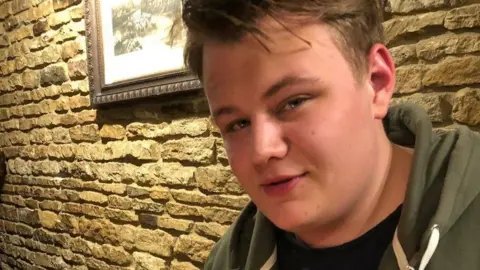 JUSTICEFORHARRY19
JUSTICEFORHARRY19Why did it cause a diplomatic row?
Following Mr Dunn’s death, his parents Charlotte Charles and Tim Dunn hoped the US would either waive Sacoolas’ immunity or she would voluntarily return to the UK.
Their campaign led them to the White House and a meeting with President Donald Trump in October 2019.
He revealed Sacoolas was in the next room, but the family felt “ambushed” and did not meet her.
In December 2019, the UK’s Crown Prosecution Service (CPS) authorised Northamptonshire Police to charge Sacoolas with causing Mr Dunn’s death.
An extradition request for her to be brought to the UK was rejected by the US government.
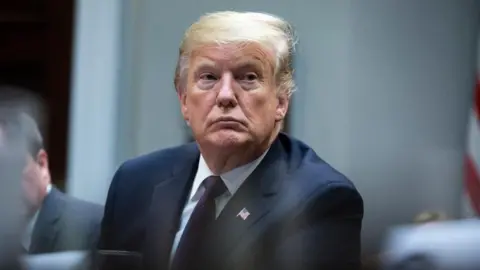 PA Media
PA MediaHow did Anne Sacoolas end up in court?
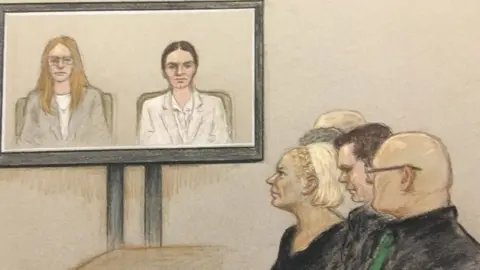 PA Media
PA MediaIn the absence of extradition, the family launched a civil claim for damages against Sacoolas and her husband in the US.
A court hearing in Virginia in February 2021 was told Sacoolas was “employed by an intelligence agency in the US” when the crash happened.
A resolution in the case was reached before Sacoolas or her husband were called to give evidence, the details of which have not been disclosed.
In December 2021, the CPS said Sacoolas would appear at a magistrates’ court in the UK to face unspecified charges.
Sacoolas finally appeared in court via video-link from the US on 29 September at Westminster Magistrates’ Court in London.
She then appeared, again by video-link, at the Old Bailey in London, where she pleaded guilty to causing death by careless driving on 20 October.
She was sentenced to eight months’ imprisonment suspended for 12 months and disqualified from driving for 12 months.
What did Harry Dunn’s family say after the hearing?
His mother said the night Harry died “was and will always be the worst ever of our lives”.
“Getting to court and getting to where we are now has been the most monumental thing for me because I can talk to him now and tell him we’ve done it. Promise complete.”
His father said: “Hopefully we’ve given hope to other families that they can do the same as us and get justice and believe and fight because it will happen in the end, it will happen.”
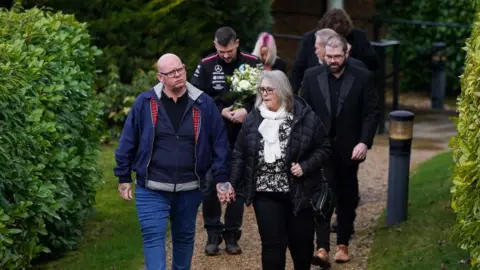 PA Media
PA MediaWhat has happened since the court hearing?
During the preparations for the inquest, human tissue was found on his clothing which was returned to the family.
The family said they were told at the time that everything had been destroyed in an explosion after the crash.
A second funeral was organised in Banbury which Mr Dunn’s mother Charlotte Charles described as “much harder” than the first service, which had been overshadowed by rumours that Mrs Sacoolas had left the UK.
She said: “I’m glad we had the opportunity today to remember him in the way we want to remember him without worrying about what people were saying to us that afternoon.”
What will happen at the inquest?
The purpose of an inquest is to answer certain questions about the death.
These are:
- Who the deceased was
- When and where they died
- The medical cause of their death
- How they came by their death
The coroner may record a verdict such as natural causes, accident or unlawful killing.
If there is insufficient evidence for any other conclusion, an open verdict might be recorded.
The coroner can also issue a longer statement describing the circumstances of the death, which is known as a narrative verdict.
Whatever the outcome, the conclusion of the inquest will mark another step in the long and painful journey Mr Dunn’s family has had to take.
Follow Northamptonshire news on Facebook, Instagram and X. Got a story? Email eastofenglandnews@bbc.co.uk or WhatsApp us on 0800 169 1830



